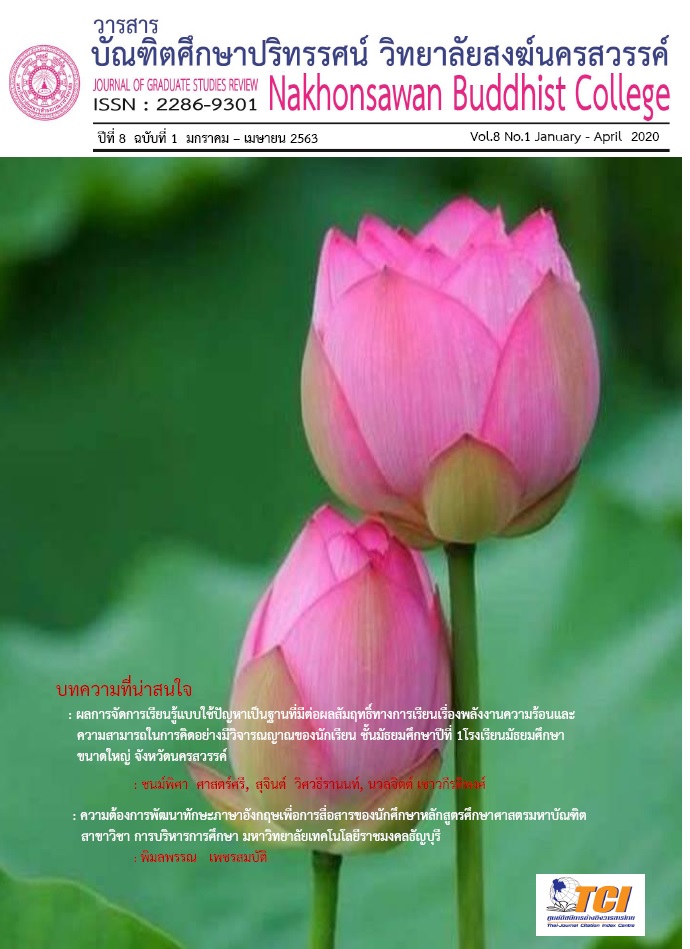ท่าทีพุทธศาสนาต่อมงคลตื่นข่าวบนฐานแห่งความจริง ทางประสาทสัมผัสและคุณค่า
Main Article Content
บทคัดย่อ
บทความนี้มีจุดมุ่งหมายที่จะศึกษาเรื่องท่าทีพุทธศาสนาที่มีต่อมงคลตื่นข่าวบนฐานความจริงทางประสาทสัมผัสและคุณค่า เพื่อหาคำตอบว่า คำสอนพระพุทธศาสนาเถรวาท มีท่าทีต่อเรื่องนี้ในลักษณะนั้นๆ อย่างไร อันจะเป็นเครื่องคลี่คลายความสงสัยเกี่ยวกับจุดยืนของพระพุทธศาสนา ที่เกี่ยวกับเรื่องดังกล่าว ผลการศึกษา พบว่าเรื่องมงคลตื่นข่าวในพุทธศาสนา สามารถแบ่งออกได้ 4 ลักษณะคือ
- มงคลตื่นข่าวในแง่กระแสสังคม ในมิตินี้พุทธศาสนาเถรวาทปฏิเสธ คือไม่ยอมรับว่ามีอยู่จริง และมองว่า การยอมรับ ความมีอยู่จริงของกระแสสังคมนี้หรือผู้หลงใหลในค่านิยมทางวัตถุของคนส่วนหนึ่งในสังคมเท่านั้น
- มงคลตื่นข่าวในแง่กระแสการตลาด ในมิตินี้พุทธศาสนาเถรวาทปฏิเสธ คือ ไม่ยอมรับว่า มีอยู่จริง เพราะเป็นการสร้างกระแส ปั่นกระแส ให้กับคนบางกลุ่มได้รับผลกระโยชน์ทางธุรกิจโฆษณาในเชิงพุทธพานิช เพื่อหารายได้ให้กับคนและพวกของตนเท่านั้น
- มงคลตื่นข่าวในแง่ที่เป็นกิเลส คือเป็นโลภะ (ความอยาก) เป็นตัณหา (ความทะยานยาก) เป็นโมหะ (ความหลง) และวิจิกิจฉา (ความเคลือบแคลงสงสัย ลังเลใจ) ซึ่งเป็นกิเลสประเภทหนึ่งที่เกิดขึ้นภายในจิตใจของบุคคลในสังคม ซึ่งพระพุทธเจ้าทรงมุ่งสอน “ให้ละ” เพราะหากไม่ละก็ไม่สามารถพ้นทุกข์ได้
- มงคลตื่นข่าวในแง่ที่เกิดจากความเข้าใจผิด คือเกิดจากความเผลอเลอสติปัญญา ขาดเหตุผลในการคิด เสพสื่อกระแสต่างๆ โดยขาดวิจารณญาณ เมื่อกลับได้สติ พินิจพิเคราะห์หาเหตุและผลได้แล้ว ก็สามารถตั้งตนอยู่ในกรอบแห่งปัญญา ที่เป็นสัมมาทิฏฐิได้ในที่สุด
Article Details
ประเภทบทความ
บทความวิชาการ (Academic Articles)


